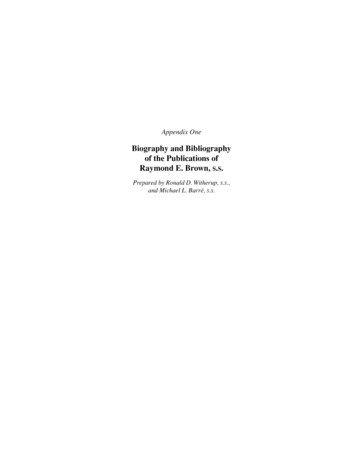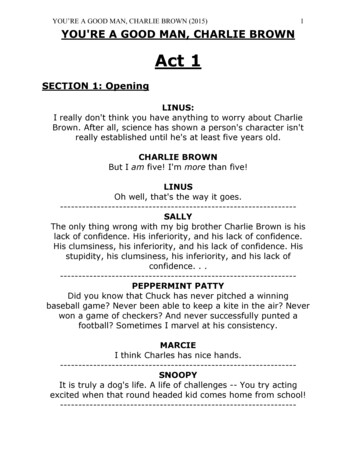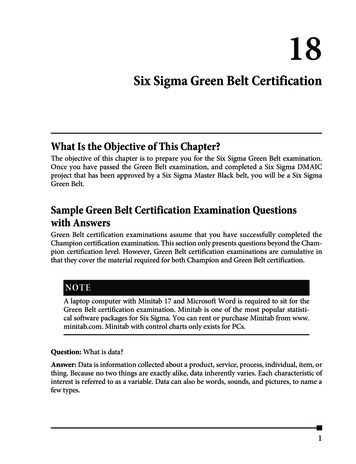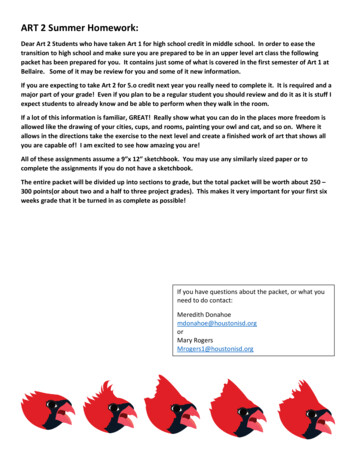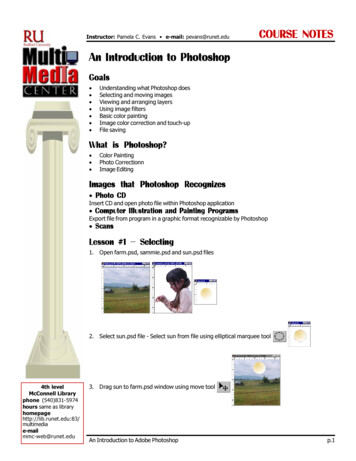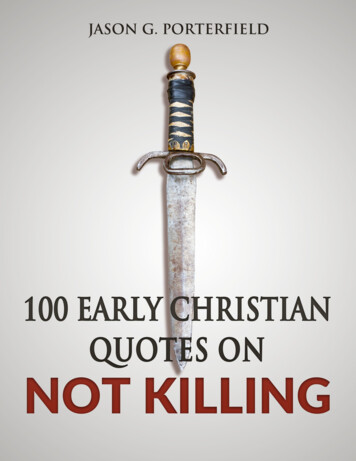
Transcription
Introduction“Above all,” Clement of Alexandria wrote in the second century, “Christians are notallowed to correct by violence sinful wrongdoings.” These words sum up well thechurch’s original stance on violence. Under no circumstances—be it war, vengeanceor self-defense—were Christians permitted to harm another person. So central wasthis conviction, that not a single writing from the church’s first three hundred yearsadvocates otherwise.Sadly, few Christians still hold this view today. And those that do are usuallydismissed as naïve idealists. Yet the early church’s unanimous agreement on thesubject should—at the very least—cause us to pause and consider what they have tosay. After all, it’s unwise to only listen to contemporary Christian voices. Learningfrom Christians throughout time and place protects us from being caught up by everypassing, theological fad.What’s more, some of the quotes in this eBook are from Christian leaders who weretaught directly by the apostles. As my friend Eddy Hall once wrote:“When we want to better understand the teachings of Jesus, it can help to look at the livesof the early Christians. The apostles learned much more from watching and listening toJesus than could be included in the Gospels. While the writings of these early Christiansdon’t have the authority of Scripture, they give us valuable insight into how the apostles, andthose who learned directly from the apostles, understood and practiced Jesus’ teachings.”In the pages that follow, I simply want to allow the earliest Christians to speak forthemselves on the topic of violence. For 1700 years, their clear teaching on the subjecthas been pushed aside and ignored. It’s high time we consider what they have to say.For the peacemakers,Jason G. PorterfieldAuthor of the upcoming book Resurrecting Peace: How Jesus Tackled Injustice,Loved Enemies and Contended for Peace on Each Day of Holy Week.
Ignatius of Antioch (c. AD 35 – 108)1. “Nothing is better than peace, by which all war of those in heaven and thoseon earth is abolished.”1The Didache (c. AD 80 – 120)2. “Bless those who curse you, pray for your enemies, and fast on behalf of thosewho persecute you: for what thanks will be due to you, if ye love only thosewho love you? Do not the Gentiles also do the same? But love those who hateyou, and you will not have an enemy.”23. “If anyone give thee a blow upon the right cheek, turn the other also to him,and thou shalt be perfect.”34. “Thou shalt not plan any evil against thy neighbor. Thou shalt not hate anyman; but some thou shalt reprove, on some thou shalt have mercy, for somethou shalt pray, and some thou shalt love above thine own soul.”4Polycarp (AD 69 – 155)5. “God will raise us from the dead if we do His will and walk in Hiscommandments not rendering evil in return for evil, or reviling in return forreviling, or fisticuff in return for fisticuff, or curse in return for curse.”5Justin Martyr (c. AD 100 – 167)6. “If you love merely those that love you, what do you do that is new?”67. “We who formerly slaughtered one another now not only do not make warupon our enemies, but for the sake of neither lying nor deceiving those judgeswho examine us, gladly die confessing Christ.”78. Spoken to the Romans: “But if the soldiers enrolled by you, and who havetaken the military oath, prefer their allegiance to their own life, and parents andcountry, and all kindred, though you can offer them nothing incorruptible, itwere verily ridiculous if we, who earnestly long for incorruption, should notendure all things, in order to obtain what we desires from Him who is able to
grant it.”89. “And we who had been filled with war and mutual slaughter and everywickedness, have each one—all the world over—changed the instruments ofwar, the swords into ploughs and the spears into farming instruments, and wecultivate piety, righteousness, love for men, faith and the hope which is fromthe Father Himself through the Crucified One.”910. “We who hated and slew one another, and because of differences in customswould not share a common hearth with those who were not of our tribe, now,after the appearance of Christ, have become sociable, and pray for our enemies,and try to persuade those who hate us unjustly, in order that they, livingaccording to the good suggestions of Christ, may share our hope of obtainingthe same reward from the God who is Master of all.”10Tatian (c. AD 110 – 170)11. “I do not want to be a king. I do not wish to be rich. I decline militarycommand. I hate fornication.”11Irenaeus (c. AD 130 – 202)12. “Christians know not how to fight, but when they are struck, offer the othercheek also.”1213. “No more shall the law say: thou shalt not kill, to him who has put away fromhimself all anger and enmity .Nor an eye for an eye and a tooth for a tooth, to himwho counts no man his enemy, but all his neighbors, and therefore cannot evenput forth his hand to revenge.”1314. “With the Lord not only is the actual murderer held guilty of having killedanother to his own damnation, but the person also who is angry with hisbrother without a cause: [Christ] commanded His disciples not only not to hatepeople, but also to love their enemies; and [He] enjoined them not only notto strike, but even, when themselves struck, to present the other cheek to thosethat mistreated them.”1415. “But if the law of liberty, that is, the word of God, preached by the apostles(who went forth from Jerusalem) throughout all the earth, caused such a
change in the state of things, that these nations did form the swords and warlances into ploughshares, and changed them into pruning hooks for reaping thecorn, that is, into instruments used for peaceful purposes, and that they arenow unaccustomed to fighting, but when smitten, offer also the other cheek,then the prophets have not spoken these things of any other person, but ofHim who effected them. This person is our Lord.”15Athenagoras (c. AD 133 – 190)16. “We have learned not only not to strike back and not to go to law with thosewho plunder and rob us, but with some, if they buffet us on the side of thehead, to offer the other side of the head to them for a blow, and with others, ifthey take away our tunic, to give them also our cloak.”1617. “It is not lawful when Christians are struck, not to offer themselves for moreblows, nor, when defamed, not to bless. For it is not enough to be just—andjustice is to return like for like—but it is incumbent upon us to be good andpatient of evil.”1718. “We Christians cannot endure to see a man being put to death, even justly.”1819. “Among us you will find uneducated persons, and artisans, and old women,who, if they are unable in words to prove the benefit of our doctrine, yet bytheir deeds exhibit the benefit arising from their persuasion of its truth: they donot rehearse speeches, but exhibit good works; when struck, they do not strikeagain; when robbed, they do not go to law; they give to those that ask of them,and love their neighbors as themselves.”19Clement of Alexandria (c. AD 150 – 215)20. “Above all, Christians are not allowed to correct by violence sinfulwrongdoings.”2021. “If you enroll as one of God’s people, heaven is your country and God yourlawgiver. And what are his laws? Thou shalt not kill . Thou shalt love thyneighbor as thyself. To him that strikes thee on the one cheek, turn also theother.”21
22. “If the loud trumpet summons soldiers to war, shall not Christ with a strain ofpeace to the ends of the earth gather up his soldiers of peace? A bloodless armyhe has assembled by blood and by the word, to give to them the Kingdom ofHeaven. The trumpet of Christ is his gospel. He has sounded, we have heard.Let us then put on the armor of peace.”2223. “We are trained, not in war, but in peace. War needs great preparation, butpeace and love require no arms nor extensive outlay.”2324. Clement speaks of the Christian poor as “an army without weapons, withoutwar, without bloodshed, without anger, without defilement.”2425. “We do not train women like Amazons to be manly in war, since we wish eventhe men to be peaceable.”25Aristides of Athens (died c. AD 134)26. “It is the Christians, O Emperor, who have sought and found the truth, forthey acknowledge God . They show love to their neighbors. They do not doto another what they would not wish to have done to themselves. They speakgently to those who oppress them, and in this way they make them theirfriends. It has become their passion to do good to their enemies . This, OEmperor, is the rule of life of the Christians, and this is their manner of life.”26Theophilus (died c. 184)27. “In regard to our being well-disposed, not only to those of our own tribe, assome think, but also to our enemies, Isaiah the prophet said, ‘Say to those thathate and curse you, you are our brothers, in order that the name of the Lordmay be glorified and it may be seen in their gladness.’”27Apollonius (died AD 185)28. “Christ taught us to allay our anger, to increase our love for others, and not topunish those who wrong us.”28
Tertullian (c. AD 160 – 225)29. “If we are enjoined to love our enemies, whom have we to hate? If injured, weare forbidden to retaliate. Who then can suffer injury at our hands?”2930. “Shall the son of peace be engaged in battle when for him it is unlawful to goto war?”3031. “And shall a Christian diligently guard at night, leaning and resting on his spearthe while with which Christ’s side was pierced?”3132. “Shall it be held lawful to make an occupation of the sword, when the Lordproclaims that he who uses the sword shall perish by the sword? And shall theson of peace take part in the battle when it does not become him even to sue atlaw?”3233. “Christ, in disarming Peter, disarmed every soldier.”3334. “If one were to make an exception for the Christian as soldier, when for everyChristian the command to openly confess the faith is binding even in the faceof torture, one would overturn the essence of the sacrament of Baptism.”3435. “Jesus cursed the works of the sword for ever after.”3536. “Truth, gentleness and justice: Who shall produce these results with the sword,and not rather those that are contrary to gentleness and justice, namely, deceitand harshness and injustice which are of course the proper business ofbattles?”3637. “How often you inflict gross cruelties on Christians , yet banded together aswe are, ever so ready to sacrifice our lives, what single case of revenge forinjury are you able to point to?”3738. “For the old law vindicated itself by the vengeance of the sword, and pluckedout eye for eye, and requited injury with punishment; but the new law pointedto clemency, and changed the former savagery of swords and lances intotranquility, and refashioned the former infliction of war upon rivals and foes ofthe law into the peaceful acts of ploughing and cultivating the earth.”38
39. “Christ is promised not as one who is powerful in war, but as a bringer ofpeace.”3940. “For what war should we not be fit and eager, even though unequal innumbers, we who are so willing to be slaughtered—if, according to thatdiscipline of ours, it was not more lawful to be slain than to slay?”4041. “The Christian does not hurt even his enemy.”4142. “It is absolutely forbidden to repay evil with evil.”4243. “But how will a Christian make war—nay, how will he serve as a soldier inpeacetime—without the sword, which the Lord has taken away?”4344. “Military service does not hold out escape from punishment of sins .Nowhere does the Christian change his character.”4445. “But now inquiry is being made concerning these issues. First, can any believerenlist in the military? Second, can any soldier, even those of the rank and file orlesser grades who neither engage in pagan sacrifices nor capital punishment, beadmitted into the church? No on both counts.”4546. “The universal rule of patience is contained in this essential commandment: wemay not do evil even when it might seem justifiable.”4647. “We pray to God for our enemies, and beseech blessings on our persecutors.”4748. “God puts his prohibition on every sort of man-killing by that one summaryprecept: ‘Thou shalt not kill’ . God certainly forbids us to hate even with areason for our hating; for he commands us to love our enemies.”48Epistle to Diognetus (written late second century)49. “Christians love all people, and are persecuted by all; they are reviled, andthey bless; they are insulted, and are respectful.”49Minucius Felix (late second to early third century)
50. “It is not right for us either to see or hear of a man being slain; and so carefulare we to abstain from human blood, that we do not even touch the blood ofeatable animals in our food.”50Pseudo-Justinian Address to the Greeks (written AD 180 to 240)51. “Learn about the incorruptible King, and know His heroes who never inflictedslaughter on the peoples.”51Didascalia Apostolorum (written c. AD 230)52. “Do not accept money for the church from soldiers who behave unrighteouslyor from those who kill men or from executioners or from any of themagistrates of the Roman Empire who are stained in wars and have shedinnocent blood.”52Hippolytus of Rome (c. AD 170 – 235)53. “The professions and trades of those who are going to be accepted into thecommunity must be examined. The nature and type of each must beestablished brothel, sculptors of idols, charioteer, athlete, gladiator give itup or be rejected. A military constable must be forbidden to kill, neither may heswear; if he is not willing to follow these instructions, he must be rejected.”53Origen (c. AD 185 -254)54. “Christians cannot slay their enemies.”5455. “To those who ask us whence we have come or whom we have for a leader, wesay that we have come in accordance with the counsels of Jesus to cut downour warlike and arrogant swords of argument into ploughshares, and weconvert into sickles the spears we formerly used in fighting. For we no longertake ‘sword against a nation,’ nor do we learn ‘any more to make war,’ havingbecome sons of peace for the sake of Jesus, who is our leader.”55
56. “God did not deem it becoming to his own divine legislation to allow thekilling of any man whatsoever.”5657. “If a revolt had been the cause of the Christians existing as a separate group ,the Lawgiver of the Christians would not have forbidden entirely the taking ofhuman life. He taught that it was never right for His disciples to go so faragainst a man, even if he should be very wicked . Moreover, if Christians hadoriginated from a revolt, they would not have submitted to laws which were sogentle, which caused them to be killed ‘as sheep,’ and made them unable everto defend themselves against their persecutors.”5758. “You cannot demand military service of Christians any more than you can ofpriests. We do not go forth as soldiers with the emperor even though hedemands it.”5859. “Concerning the Christians, they have been taught not to defend themselvesagainst their enemies; and because they have kept the laws which commandgentleness and love to man, on this account they have received from God thatwhich they could not have succeeded in doing if they had been given the rightto make war, even though they may have been quite able to do so.”5960. “But taking simply what He says, ‘those who take the sword shall perish by thesword,’ we should beware lest because of warfare or the vindication of ourrights or for any occasion we should take out the sword, for no such occasionis allowed by this evangelical teaching, which commands us to fulfill what iswritten, ‘with those who hated me, I was pacific.’ If therefore with those whohate peace we must be pacific, we must use the sword against no one.”6061. “The Gospel doctrine of peace does not permit people to take vengeance evenupon enemies.”61Cyprian (c. AD 202 – 258)62. “God designed iron for tilling, not killing.”6263. “Homicide is a crime when individuals commit it, but it is called a virtue, whenit is carried on publicly.”6364. “None of us offers resistance when he is seized, or avenges himself for yourunjust violence, although our people are numerous and plentiful it is not
lawful for us to hate, and so we please God more when we render no requitalfor injury we repay your hatred with kindness.”6465. “And what more—that you should not curse; that you should not seek againyour goods when taken from you; when buffeted you should turn the othercheek; and forgive not seven times but seventy times seven, that you shouldlove your enemies and pray for your adversaries and persecutors?”6566. “When an injury has been received, one has to remit and forgive it . Requitalfor wrongs is not to be given . Enemies are to be loved.”6667. “The hand that has held the Eucharist must not be sullied by the blood-stainedsword.”67Commodianus (c. AD 250)68. “Make thyself a peacemaker to all men.”6869. “Do not hurt anyone.”69Dionysius of Alexandria (died AD 264)70. “Love is ever on the alert to do good even to him who is unwilling to receiveit.”7071. “He [Jesus] seized the weapons from their hands, and rent from them everyoccupation that relies upon them.”71Lactantius (c. AD 250-325)72. Christians are “those who are ignorant of wars, who preserve concord with all,who are friends even to their enemies, who love all men as brothers, who knowhow to curb anger and soften with quiet moderation every madness of themind . This we believe to be to our advantage, that we should love you andconfer all things upon you who hate us.”7273. “God has commanded that enmities are never to be contracted by us, but arealways to be removed, so that we may soothe those who are our enemies by
reminding them of their relationship to us.”7374. “For he who endeavors to return an injury, desires to imitate that very personby whom he has been injured. Thus, he who imitates a bad man can by nomeans be good.”7475. “No exception at all ought to be made to the rule that it is always wrong to killa man, whom God has wished to be a sacrosanct creature.”7576. “But if God alone were worshipped, there would not be dissensions and wars,since people would know that they are the children of one God; and, therefore,among those who were connected by the sacred and inviolable bond of divinerelationship.”7677. “Cicero [a critic of Christianity] says in his De Officis, ‘He is a good man whoprofits those whom he can, and injures no one unless provoked by injury.’ Oh,how he marred a simple and true sentiment by the addition of a few words. Forwhat need was there of adding these words, ‘unless provoked by injury’? that hemight append vice as a disgraceful tail to a good man and might represent himwithout patience, which is the greatest of all the virtues. He said that a goodman would inflict injuries if he were provoked: now he must necessarily losethe name of a good man from this very circumstance, if he shall inflict injury.”7778. “For how can he be just who injures, hates, despoils, kills? And those whostrive to serve their country do all these things.”7879. “For when God forbids us to kill, he not only prohibits us from open violence,which is not even allowed by the public laws, but he warns us against thecommission of those things which are esteemed lawful among men. Thus, itwill be neither lawful for a just man to engage in warfare, since his warfare isjustice itself, nor to accuse anyone of a capital charge, because it makes nodifference, whether you put a man to death by word, or rather by sword, sinceit is the act of putting to death itself which is prohibited.”7980. “For what are the interests of our country, but the inconveniences of anotherstate or nation?—that is, to extend the boundaries which are evidently takenfrom others, to increase the power of the state, to improve the revenues—allwhich things are not virtues, but the overthrowing of virtues; for in the firstplace, the union of human society is taken away, innocence is taken away, theabstaining from the property of another is taken away; lastly, justice itself istaken away, which is unable to bear the tearing asunder of the human race, and
wherever arms have glittered, must be banished and exterminated fromthence.”8081. “What then, or where, or of what character is piety? Truly, it is among thosewho are ignorant of wars, who maintain concord with all, who are friendly evento their enemies, who love all people as brothers and sisters, who know how torestrain their anger, and to soothe all fury of mind by quiet control.”8182. “Patience is to be regarded as a very great virtue; and that the just man mightobtain this, God willed that he should be despised as sluggish. For unless heshall have been insulted, it will not be known what fortitude he has inrestraining himself. Now if, when provoked by injury, he has begun to followup his assailant with violence, he is overcome. But if he shall have repressedthat emotion by reasoning, he altogether has command over himself. He is ableto rule himself. And this restraining of oneself is rightly named patience, whichsingle virtue is opposed to all vices and affections.”8283. Spoken of the Romans during the Great Persecution, Lactantius writes, “Ifanyone has slain a single man, he is regarded as contaminated and wicked, nordo they think it right that he should be admitted to this earthly dwelling of thegods. But he who has slaughtered endless thousands of men, deluged the fieldswith blood, and infected rivers with it, is admitted not only to a temple, buteven to heaven.”8384. Addressed to his Roman critics, Lactantius writes, “Oh how great the darkness that you imagined the ascent to heaven to be open to people throughslaughters and bloodshed! And Cicero also assented to this delusion . If thisis the virtue which renders us immortal, I for my part should prefer to die,rather than to be the cause of destruction to as many as possible. If immortalitycan be obtained in no other way than by bloodshed, what will be the result if allshall agree to live in harmony?”8485. “From what source do contests, fightings and contentions arise among men,except that impatience opposed to injustice often excites great anger? But ifyou meet injustice with patience , it will immediately be extinguished asthough you should pour water on a fire. But if that injustice which provokesopposition has met with impatience equal to itself, as though overspread withoil, it will excite so great a firestorm, that no stream can extinguish it, but onlythe shedding of blood.”85
86. “His is not a fool who does not even spare himself to prevent injury toanother, which is an evil . A person who has the knowledge of good and evilabstains from committing an injury even to his own damage.”86Arnobius (c. AD 255 – 330)87. “For since we—so large a force of men—have received it from his teachingsand laws, that evil ought not to be repaid with evil, that it is better to endure awrong than to inflict it, to shed one’s own blood rather than stain one’s handsand conscience with the blood of another, the ungrateful world has long beenreceiving a benefit from Christ, through whom the madness of savagery hasbeen softened.”8788. Contrasting Jesus with the rulers of the Roman Empire, Arnobius asks, “DidJesus claim royal power for himself, occupy the whole world with fierce armies,destroy and remove peaceful nations, and compel others to put their necksbeneath his yoke and obey him?”8889. “If Christ had determined that none should do him violence, he would havestriven to the utmost to repel his enemies, even by directing his power againstthem. Could not he, then, who had restored sight to the blind, make hisenemies blind if it were necessary? Would it have been difficult for him whoraised the dead from their tombs to inflict death on whom he would? But he, with gentleness passing understanding and belief, submitted to theviolence of savage and most hardened soldiers.”89The Egyptian Church Order (probably early third century)90. “The soldier who is of inferior rank shall not kill anyone. If ordered to, he shallnot carry out the order, nor shall he take the oath. If he does not accept this, lethim be dismissed. Anyone who has the power of the sword or the magistrate ofa city who wears the purple, let him give it up or be dismissed. The catechumenor believer who wish to become soldiers shall be dismissed, because they havedespised God.”90Maximilian of Tebessa (AD 274 – 295)
91. Maximilian was the son of a Roman soldier, and thus was legally mandated toenlist in the military at the age of 21. On March 12, 295, he was brought beforethe proconsul of Africa to swear allegiance to the Emperor as a soldier. Herefused, stating, “I cannot serve as a soldier; I cannot do evil; I am a Christian.”For these remarks, Maximilian was promptly beheaded.91Marcellus the Centurion (c. AD 250 – 298)92. On occasion of the Emperor’s birthday, Marcellus cast off his military belt andcalled out, “I serve Jesus Christ, the eternal king.” When brought before ajudge for his insubordinate act, he explained, “I threw down my arms; for itwas not seemly that a Christian man, who renders service to the Lord Christ,should render it also by inflicting earthly injuries.” For this, he was martyred.92Typasius the Martyr (died AD 304)93. When Typasius was ordered to serve in the army, he answered, “Now I serveChrist. Before I served the world.” When commanded a second time to takehis place in the ranks, he responded, “No one after victory returns to the battle.As far as I am concerned, I have conquered the world; I have enrolled amongthe servants of Christ. I am a soldier of Christ, I serve Christ; and if you wantto rage against me, it is for Christ that I shall suffer.”93Athanasius of Alexandria (c. AD 296 – 373)94. “Christians, instead of arming themselves with swords, extend their hands inprayer.”94Martin of Tours (AD 316 – 397)95. Forced to join the Roman army, Martin modeled kindness to his fellow soldiersand extreme generosity to the poor. On the eve of his first battle, however,Martin declared, “I am the soldier of Christ. It is not lawful for me to fight.”When ridiculed as a coward, he replied, “I will take my stand unarmed beforethe line of battle tomorrow, and in the name of the Lord Jesus, protected bythe sign of the cross and not by shield or helmet, I will safely penetrate the
ranks of the enemy.” On the following day, the barbarians surrendered withoutbattle, and Martin’s life was spared.95Pseudo-Clementine Recognitions (c. AD 320-380)96. “Wars and contests are born from sin; but where sin is not committed there ispeace to the soul.”96Basil of Caesarea (AD 330 – 379)97. Lamenting the world’s glorification of violence, Basil wrote, “Many gain gloryfrom the valor they show in battle. They go so far as to boast of the murder oftheir brothers. Indeed, military courage and the triumphal arches erected by ageneral or the community exist only through the magnitude of the murder.”97Ambrose (c. AD 340 – 397)98. Ambrose composed the following poem for the anniversary of three martyrs:Victor, Nabor and Felix.The faith of the maternal ChurchFilled them with Holy SpiritAnd was crowned thriceBy the holy blood of martyrs.Having torn them away from the impious camps,She consecrated them as Christ’s soldiers .They do not request iron armsNor weapons, these soldiers of Christ .For the true man, faith is a shieldAnd death a victory.98The Testament of the Lord (written late fourth to early fifth century)99. “If anyone be a soldier or in authority, let him be taught not to oppress or tokill or to rob, or to be angry or to rage and afflict anyone. But let those rationssuffice him which are given to him. But if they wish to be baptized in theLord, let them cease from military service or from the post of authority, and if
not let them not be received.”99100. “Let a catechumen or a believer of the people, if he desires to be a soldier,either cease from his intentions, or if not let him be rejected. For he hasdespised God by his thought, and leaving the things of the Spirit, he hasperfected himself in the flesh, and has treated the faith with contempt.”100
Ignatius, Epistle to the Ephesians, 13.2.Didache, 1.2.3 Ibid., 1.3.4 Ibid., 2.6f.5 Polycarp, The Epistle of Polycarp to the Philippians, 2.6 Justin Martyr, First Apology, 15.7 Ibid., 39.8 Ibid., 39.9 Idem, Dialogue with Trypho, 109f.10 Idem, First Apology, 14.11 Tatian, Address to the Greeks, 11.12 Irenaeus, Against Heresies, 4.34.13 Idem, Proof of the Apostolic Preaching, 96.14 Idem, Against Heresies, 2.32.15 Ibid., 4.34.16 Athenagoras, A Plea for the Christians, 1.17 Ibid., 34.18 Ibid., 35.19 Ibid., 11.20 Clement, frag in Maximus Confessor, Serm 55. (seeMigne, Patrologia Graeca, xci. 965).21 Idem, Exhortation to the Greeks, 10.22 Ibid., 11.23 Idem, The Educator, 1.12.24 Idem, Who Is the Rich Man That Shall Be Saved?, 34.25 Idem, Miscellanies, 4.8.26 Aristides, Aristides’ Apology, 15.3.27 Theopholis, To Autolycus, 3.14.28 Apollonius, Acts of Apollonius, 37.29 Tertullian, Apology, 37.30 Idem, On Idolatry, 19.31 Idem, The Military Crown, 11.32 Ibid., 11.33 Idem, Apology, 37.34 Idem, The Military Crown, 11.35 Idem, On Patience, 3.36 Idem, Against Marcion, 3.14.37 Idem, Apology, 37.38 Idem, Against the Jews, 3.39 Idem, Against Marcion, 3.21.40 Idem, Apology, 37.41 Ibid., 46.42 Idem, On Patience, 10.43 Idem, On Idolatry, 19.44 Idem, The Military Crown (de Corona Militia), 11.45 Idem, On Idolatry, 19.46 Idem, On Patience, 6.47 Idem, Apology, 31.48 Idem, On the Spectacles, 2, 16.49 The Epistle to Diognetus, 5.11, 15.50 Minucius Felix, Octavius, 30.6.51 Pseudo-Justinian, Address to the Gentiles, 5.Didascalia Apostolorum IV, 6.4.Hippolytus, Apostolic Tradition, 16.9-17.54 Origen, Against Celsus, 7.26.55 Ibid., 5.33.56 Ibid., 3.757 Ibid., 3.7.58 Ibid., 8.73.59 Ibid., 3.8.60 Idem, Commentary on Matthew, 26:52. Quoted inWindass, “War,” 240.61 Idem, Against Celsus, 2.30.62 Cyprian, On the Dress of Virgins, 1
17. “It is not lawful when Christians are struck, not to offer themselves for more blows, nor, when defamed, not to bless. For it is not enough to be just—and justice is to return like for like—but it is incumbent upon us to be good and patient of evil.”17 18. “We Christians canno
